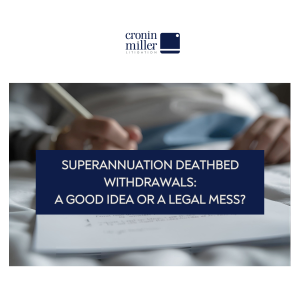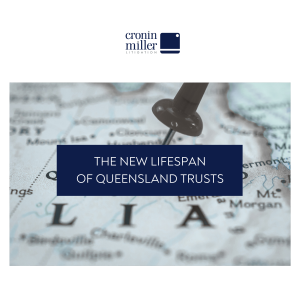You may have noticed a clause in a Will which provides the executors with a “power of appropriation”. Although this clause is commonly found in Wills, there has always been a cloud of uncertainty over whether such a power in a Will is limited by a conflicting clause in the Trusts Act 1979 (Qld).
The Supreme Court has recently provided some much-needed clarity on this issue. Cronin Miller Litigation instructed Mr Robert Whiteford of Counsel at the hearing of an application for the Court’s direction on the statutory interpretation of this issue.
What is a Power of Appropriation?
Generally, a “power of appropriation” provides the executor with discretion to appropriate (or allocates) any asset of the estate towards the satisfaction of a specific legacy, gift or a share of the residuary estate. An example of this would be where a mother leaves her house to her two children in equal shares, as a specific gift in her Will. A power of appropriation in the Will allows the executor to give the whole house to one child, and the equivalent value in cash to the other child.
Generally speaking, there are three ways in which an executor may appropriate assets of an estate to a beneficiary:
- under the general law, an executor may, with the agreement of the beneficiary, or with the authorisation of the Courts, appropriate assets to a beneficiary in part or whole satisfaction of a beneficiary’s entitlement;
- by the provisions of the Will, which may confer a specific power of appropriation on the executor; and
- pursuant to s33(1)(l) of the Trusts Act, subject to the limitations, which are outlined below.
What does the Trusts Act say?
Section 33(1)(l) of the Trusts Act states that a trustee (or executor) may, in respect of trust property, appropriate any part of the trust property towards satisfaction of a legacy or share to which that beneficiary is entitled, however:
- the appropriation shall not be made so as to adversely affect any specific gift (section 33(1)(l)(i)); and
- the appropriation is not effective until notice of it has been given to all persons interested in the appropriation to allow them the opportunity to apply to the Court to challenge the appropriation (section 33(1)(l)(ii)).
Section 31(1) of the Trusts Act states, in reference to Part 4 of the Trusts Act (and it should be noted that section 33 is in Part 4):
“Except where otherwise provided in this Part, the provisions of this Part shall apply whether or not a contrary intention is expressed in the instrument (if any) creating the trust.”
Conflicting with Part 1 of the Trust Act is section 4 of the Trusts Act which states, relevantly:
(2) Nothing in this Act shall preclude a settlor from conferring on a trustee or other person exercising the power of a trustee under this Act any powers additional to or larger than those conferred by this Act.
(3) Any additional or larger powers so conferred shall, as far as may be, notwithstanding anything in this Act, and unless a contrary intention is expressed in the instrument (if any) creating the trust, operate and be exercisable in the like manner and with all the like incidents effects and consequences as if conferred by this Act.
(4) The powers conferred by or under this Act on a trustee are in addition to the powers given by any other Act and by the instrument (if any) creating the trust; but the powers conferred on the trustee by this Act, unless otherwise provided, apply if and so far only as a contrary intention is not expressed in the instrument (if any) creating the trust, and have effect subject to the terms of that instrument.”
Fox v Waller [2023] QSC 169
In the matter of Fox v Waller, the executors made application to the Court pursuant to section 6 of the Succession Act 1981 (Qld) to obtain the Court’s direction on whether the power of appropriation conferred on the executors pursuant to the Will was subject to, or restricted by, s33(1)(l) of the Trusts Act.
The executors’ need for direction concerned real property that was specifically gifted pursuant to the terms of the Will, and the conflicting wishes of beneficiaries as to how that real property was to be dealt with by the executors.
The primary issue before the Court was whether section 31 caused the limitations in section 33 to apply, or if section 4 allowed the powers of appropriation to be enlarged to the terms expressly stated in the trust instrument (being the Will).
In this estate, the appropriation power in the Will was wider than the appropriation power in s33(1)(l). The Will provides the executors with broad discretion to appropriate any assets of the estate in or towards the satisfaction of a legacy or share without the consent of any beneficiary.
Arguments were made concerning, broadly:
- whether section 31(1) should be narrowly interpreted to require that the limitations in section 33(1)(l) apply to any power of appropriation, regardless of an express broader power in the trust instrument; or
- if section 31(1) and, consequently, section 33(1)(l) should be read down on the basis that section 4(2), (3) and (4) conflict with section 31(1), in circumstances where section 4 is to be considered the leading provision.
His Honour Justice Cooper determined that section 4 was the leading provision in the Trusts Act for the purposes of determining the relationship between a trust instrument (such as a Will) and the provisions of the Trusts Act.
It follows, his Honour determined that the limitations prescribed to the power of appropriation by section 33(1)(l) of the Trusts Act do not apply to, nor limit the exercise of, the grant of a wider power of appropriation in a trust instrument.
For any fellow practitioners who work in estate planning, estate administration or estate litigation, his Honour goes into great detail on the merits of favouring the reading down approach over the narrow interpretation of the statute. It is a worthwhile read.
Fox v Waller [2023] QSC 169 – Supreme Court of Queensland – Trial Division Caselaw



